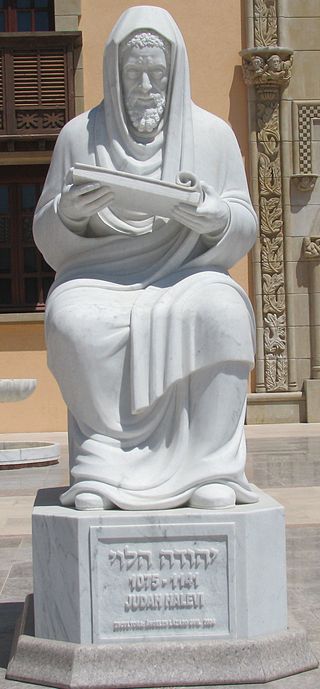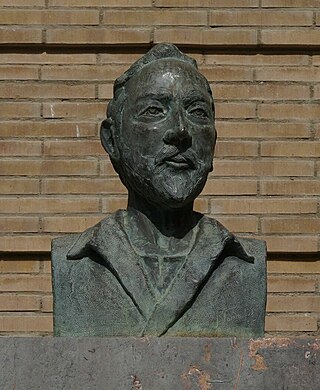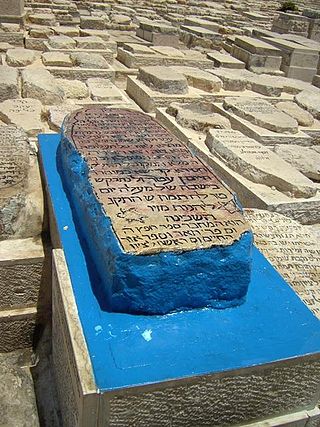Related Research Articles

A siddur is a Jewish prayer book containing a set order of daily prayers. The word siddur comes from the Hebrew root ס־ד־ר, meaning 'order.'

Rabbinic literature, in its broadest sense, is the entire spectrum of works authored by rabbis throughout Jewish history. The term typically refers to literature from the Talmudic era, as opposed to medieval and modern rabbinic writings. It aligns with the Hebrew term Sifrut Chazal, which translates to “literature [of our] sages” and generally pertains only to the sages (Chazal) from the Talmudic period. This more specific sense of "Rabbinic literature"—referring to the Talmud, Midrashim, and related writings, but hardly ever to later texts—is how the term is generally intended when used in contemporary academic writing. The terms mefareshim and parshanim almost always refer to later, post-Talmudic writers of rabbinic glosses on Biblical and Talmudic texts.

Abraham ben Meir Ibn Ezra was one of the most distinguished Jewish biblical commentators and philosophers of the Middle Ages. He was born in Tudela, Taifa of Zaragoza.

Judah Halevi was a Sephardic Jewish poet, physician and philosopher. He was born in Al-Andalus, either in Toledo or Tudela, in 1075. He is thought to have died in 1141, in either Jerusalem, at that point the Crusader Kingdom of Jerusalem, or in Alexandria, Egypt.
Abraham bar Ḥiyya ha-Nasi, also known as Abraham Savasorda, Abraham Albargeloni, and Abraham Judaeus, was a Catalan Jewish mathematician, astronomer and philosopher who resided in Barcelona, then in the County of Barcelona.
Israel ben Moses Najara was a prolific Jewish liturgical poet, preacher, Biblical commentator, kabbalist, and rabbi of Gaza.
Judah ben Samuel of Regensburg, also called Yehuda HeHasid or 'Judah the Pious' in Hebrew, was a leader of the Chassidei Ashkenaz, a movement of Jewish mysticism in Germany considered different from the 18th-century Hasidic movement founded by the Baal Shem Tov.

Benjamin of Tudela, also known as Benjamin ben Jonah, was a medieval Jewish traveler who visited Europe, Asia, and Africa in the twelfth century. His vivid descriptions of western Asia preceded those of Marco Polo by a hundred years. With his broad education and vast knowledge of languages, Benjamin of Tudela is a major figure in medieval geography and Jewish history.
Yom Tov ben Abraham of Seville commonly known by the Hebrew acronym Ritva, was a medieval rabbi and rosh yeshiva of the Yeshiva of Seville, known for his commentaries on the Talmud.

Chaim ibn Attar or Ḥayyim ben Moshe ibn Attar also known as the Or ha-Ḥayyim after his popular commentary on the Torah, was a Talmudist and Kabbalist. He is arguably considered to be one of the most prominent Rabbis of Morocco, and is highly regarded in Hassidic Judaism.
Joseph ibn Plat was a Rabbinical authority of the twelfth century CE. He is presumed to have been born in southern Spain, whence he went to Provence and settled in Lunel, though Epstein is of opinion that he was born in the Byzantine Empire. If this is so, he may be identical with the Joseph whom Benjamin of Tudela met in Damascus. He also spent some time in Rome, Italy, and may have traveled in France, Lorraine, Lombardy, and Spain. According to Joseph ibn Tzaddik, he was flourishing in the year 1205; according to Abraham ben Solomon of Torrutiel, he died in 1225; but according to others he died before 1198. Abraham ben David, Asher ben Meshullam, and Zerahiah ha-Levi Gerondi, all of Lunel, received oral instruction from him, and he corresponded with Zerahiah and Abraham ben David in Posquières; in addition, he corresponded with Maimonides and Abraham ben Isaac of Narbonne. He wrote a treatise on the prayers entitled Tikkun Soferim, of which a fragment is extant. His halakic treatises, commentaries on various Talmudic books, such as Nedarim and Hullin, are quoted in the Ittur, the Kol Bo, and Shittah Mequbbetzet to Nedarim, and extracts are to be found in the Pardes; his name, however, is cited in the last-named only in one long citation on the Benedictions.
Samuel ben Hofni was the gaon of Sura Academy in Mesopotamia ("Babylonia") from 998 to 1012.
Samuel ben Kalonymus he-Hasid of Speyer, was a Tosafist, liturgical poet, and philosopher of the 12th century, surnamed also "the Prophet". He seems to have lived in Spain and in France. He was the first of the Chassidei Ashkenaz, and the father of Judah ben Samuel of Regensburg.
Shem-Tob ben Isaac Shaprut of Tudela was a Spanish Jewish philosopher, physician, and polemicist. He is often confused with the physician Shem-Tob ben Isaac of Tortosa, who lived earlier. He may also be confused with another Ibn Shaprut, Hasdai Ibn Shaprut, who corresponded with the king of the Khazars in the 900's.
Judah ben Nathan, also referred to by the Hebrew acronym RiVaN, was a gifted French rabbi and commentator on the Talmud in the eleventh to twelfth century, best known for being the son-in-law and pupil of the great commentator Rashi, and to a great extent his continuator.
The history of the Jews in Tudela, Spain goes back well over one thousand years.

Shimon Lavi was a Sephardi Hakham, kabbalist, physician, astronomer, and poet. He is credited with the founding of religious institutions and the revival of Torah study in Tripoli, Libya, in the mid-sixteenth century, where he served as spiritual leader and dayan for more than three decades. He authored a commentary on the Zohar titled Ketem Paz and the piyyut, "Bar Yochai", a kabbalistic hymn which became widely popular in the Jewish world. Libyan Jews consider him their greatest scholar.

Isaac ben Melchizedek, was a rabbinic scholar from Siponto, Italy, and one of the first medieval scholars to have composed a commentary on the Mishnah, of which only his commentary on Seder Zera'im survives. Elements of the Mishnaic order of Taharot are also cited in his name by the Tosafists, but the complete work is no longer extant.
There have been many commentaries on the biblical Book of Job.
References
 This article incorporates text from a publication now in the public domain : Singer, Isidore; et al., eds. (1901–1906). "Ibn Shu'aib, Joel". The Jewish Encyclopedia . New York: Funk & Wagnalls.
This article incorporates text from a publication now in the public domain : Singer, Isidore; et al., eds. (1901–1906). "Ibn Shu'aib, Joel". The Jewish Encyclopedia . New York: Funk & Wagnalls.